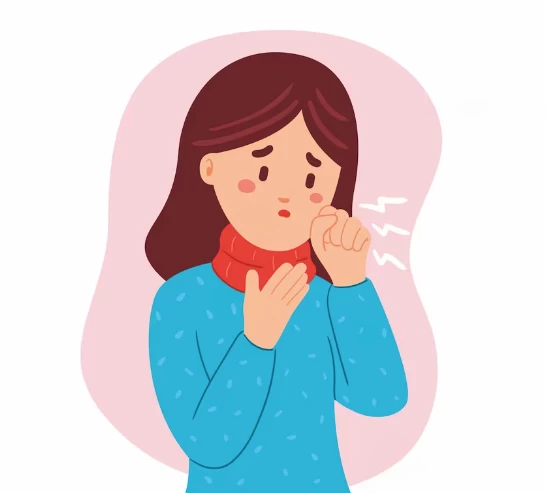
Chronic Cough Shouldn't Be Taken Lightly
- Chronic Cough Shouldn't Be Taken Lightly
- What is Cough?
- What is Chronic Cough?
- What Are the Potential Causes of Chronic Cough?
- How Should Chronic Cough Be Managed?
- In conclusion;
Chronic cough is a persistent, irritating symptom that often indicates an underlying health issue. It's a complex condition that requires identifying the root cause and establishing an effective treatment plan. In other words, cough can be a sign of serious health problems. In this article I have prepared for you, I will share information about the definition of chronic cough, its potential causes, and effective management.
What is Cough?
Before defining "Chronic Cough," I find it helpful to refresh our knowledge about cough. Cough is a reflex that occurs when the respiratory passages, responsible for carrying air to the lungs, suddenly and forcefully contract. Cough functions as a mechanism to expel, clean, and protect the respiratory system from various particles and irritants. Cough serves as an important defense mechanism for clearing the respiratory passages, removing foreign matter, or dealing with infections.
Cough is often triggered by a factor, allergen, infection, or another irritant in the body. For instance, accumulation of mucus or foreign objects in the respiratory passages can cause coughing. Additionally, irritants like cigarette smoke, polluted air, dust, and pollen can also trigger cough.
Cough is usually categorized into two main types:
- Dry Cough: A type of cough that occurs without the presence of phlegm or mucus and irritates the throat. It can be seen particularly due to upper respiratory irritations or allergens.
- Productive (Wet) Cough: A type of cough accompanied by phlegm, mucus, or secretions. This type of cough can be triggered by irritation or infections in the lower respiratory passages such as the lungs and bronchi.
Cough can often be a temporary symptom that resolves on its own. However, if a cough persists for a long time or is severe, or if it is accompanied by other symptoms like shortness of breath, fever, or coughing up blood, it is important to consult a healthcare professional. Especially in cases of chronic or treatment-resistant cough, identifying the underlying cause and creating an appropriate treatment plan is crucial.
What is Chronic Cough?
Chronic cough is typically defined as a persistent cough that lasts for more than 8 weeks. During this period, the symptom of cough adversely affects a person's daily life, disrupts sleep patterns, and reduces their quality of life. Chronic cough can arise from various underlying causes and accurate diagnosis is essential for establishing an appropriate treatment and management plan.

What Are the Potential Causes of Chronic Cough?
Chronic cough has many potential causes, most of which are associated with underlying medical conditions. For example:
- Upper Respiratory Infections: Conditions like chronic sinusitis or postnasal drip can lead to chronic cough.
- Asthma: Asthma is a common cause of chronic cough. Coughing, especially during the night and early morning, can be increased in asthma.
- Gastroesophageal Reflux Disease (GERD): GERD, where stomach acid flows back into the esophagus, can cause chronic cough.
- Cigarette Smoke: Smoking or exposure to cigarette smoke can trigger chronic cough.
- Medication Side Effects: Some medications, particularly ACE inhibitors used for blood pressure, can cause cough.
- Lung Infections: Conditions like chronic bronchitis or bronchiectasis can lead to chronic cough.
- Respiratory Irritation: Exposure to polluted air, chemical irritants, or allergens can trigger cough.
How Should Chronic Cough Be Managed?
Effectively managing chronic cough involves identifying the underlying cause. Treatment typically includes the following steps:
- Identifying the Underlying Cause: A proper diagnosis involves taking a patient's medical history, physical examination, and, when necessary, imaging tests (X-rays, CT scans).
- Lifestyle Changes: Lifestyle changes such as quitting smoking and reducing exposure to allergens are recommended.
- Medication: Underlying conditions like asthma or GERD are treated with medications. Bronchodilators, corticosteroids for asthma, antacids, or proton pump inhibitors for GERD may be used.
- Adherence to Treatment: Managing chronic conditions like asthma requires regular medication use. Patient adherence to treatment is crucial.
- Surgical Intervention: In some cases, such as bronchiectasis or conditions related to GERD, surgical options might be considered.
- Patient Education: Patients should be educated about managing symptoms, medication use, and understanding the underlying condition.
In conclusion;
Chronic cough is a persistent symptom that can stem from various underlying causes. Accurate diagnosis and effective management can enhance a patient's quality of life. Consultation and treatment recommendations from an Otolaryngologist are critical in effectively managing the issue of chronic cough.





